
The painted apple moth is a tussock moth native to Australia. It is notable as a pest in pine forests, and is classified as a pest in New Zealand.
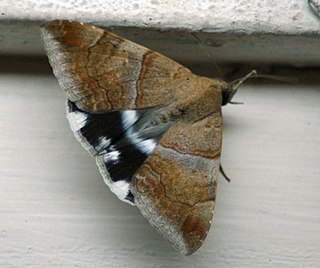
Achaea janata, the castor semi-looper or croton caterpillar, is an erebid moth, the caterpillars of which are termed 'semi-loopers' due to their mode of locomotion. It is found from the Indo-Australian tropics and subtropics, extending south to New Zealand and east through the Pacific archipelagoes to Easter Island. It is a major pest of castor throughout the world.
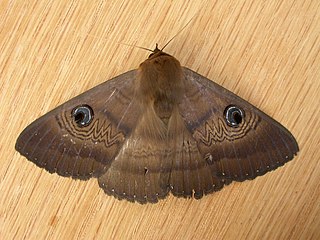
Dasypodia selenophora, the southern old lady moth, is a moth of the family Noctuidae. The species was first described by Achille Guenée in 1852. It is found in the southern half of Australia, as well as Norfolk Island, New Zealand and Macquarie Island.

Diatenes aglossoides is a moth of the family Erebidae first described by Achille Guenée in 1852. It is found in most of Australia.

Phalaenoides glycinae, the Australian grapevine moth, is a moth of the family Noctuidae that is native to southeastern Australia. The species was first described by John Lewin in 1805.

Pantydia is a genus of moths in the family Erebidae.

Ophiusa tirhaca, the green drab, is a moth of the family Erebidae. The species was first described by Pieter Cramer in 1777. It is found in southern Europe, Africa, Australia and the southern parts of Asia.

Speiredonia spectans, the granny's cloak moth, is a moth of the family Erebidae. The species was first described by Achille Guenée in 1852. It is found in north-eastern Australia and Tasmania. Strays have been recorded on Norfolk Island and in New Zealand.

Anomis flava, the cotton looper, tropical anomis or white-pupiled scallop moth, is a moth of the family Erebidae. The species was first described by Johan Christian Fabricius in 1775. It is found in large parts of the world, including China, Hawaii, São Tomé and Príncipe, the Society Islands, Thailand, New Zealand, and Australia. Subspecies Anomis flava fimbriago is found in North America.
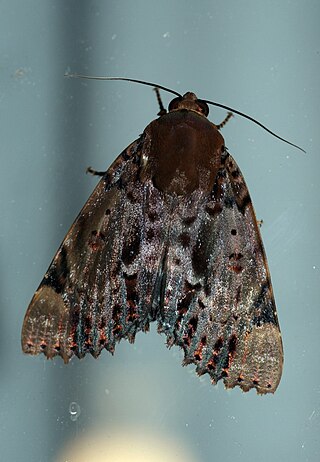
Arcte coerula, the ramie moth, is a moth of the family Noctuidae. The species was first described by Achille Guenée in 1852. It is found from in south-east Asia, including Fiji, India, Sri Lanka, Myanmar, Japan, New Guinea, Taiwan and Norfolk Island. It has been recently observed in Hawaii, on the island of Maui.

Achaea serva is a species of noctuid moth of the family Erebidae first described by Johan Christian Fabricius in 1775. It is found from the Indo-Australian tropics of India, Sri Lanka, Myanmar, China, Borneo, Hong Kong, Java, the Philippines, the New Hebrides, to Okinawa, many western Micronesian islands and New Guinea and Australia.

Ophiusa discriminans is a moth of the family Erebidae first described by Francis Walker in 1858. It is found in Brunei, New Caledonia, New Guinea, Sri Lanka, Thailand and in Australia in the Northern Territory and Queensland.
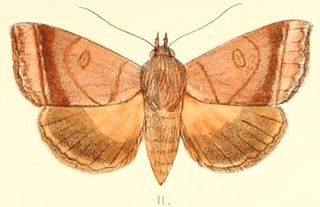
Ophiusa trapezium is a moth of the family Erebidae first described by Achille Guenée in 1852. It is found from the Indo-Australian tropics of India, Sri Lanka to Queensland, the Bismarck Islands and New Caledonia. Adults are fruit piercers.

Ctenoplusia limbirena, the Scar Bank gem, or silver U-tail, is a moth of the family Noctuidae. It is found in south-western Europe, Africa, the Canary Islands, Arabia, the southern Himalayas, India, Sri Lanka, Indochina to south-eastern China, Taiwan, Sulawesi, Bali and Timor. In New Zealand, it has been established since 2011.

Sympis rufibasis is a moth of the family Noctuidae first described by Achille Guenée in 1852. It is found from the Indo-Australian tropics of India, Sri Lanka, Borneo east to New Guinea, the Solomons and Queensland.

Serrodes campana is a species of moth of the family Erebidae first described by Achille Guenée in 1852. It is found from the Indo-Australian tropics to eastern Australia, Fiji, Samoa and New Caledonia. It is also present in Japan, Korea and Sri Lanka. The adult is a fruit piercer, but also feeds on flower nectar.

Paectes arcigera is a moth in the family Euteliidae first described by Achille Guenée in 1852. It is restricted to the eastern Caribbean Islands, ranging from Puerto Rico to the Lesser Antilles.

Erygia apicalis is a moth of the family Erebidae first described by Achille Guenée in 1852. It is found from the Indo-Australian tropics of India, Sri Lanka to Japan, Australia and the Solomon Islands. The habitat consists of lowland areas, including dry heath forests and softwood plantations.
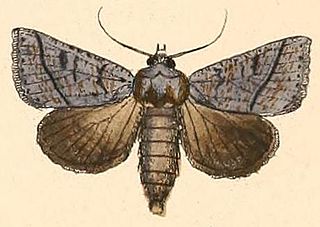
Pantydia canescens is a species of moth of the family Erebidae. It is found in Australia, where it has been recorded from Victoria.
Pantydia diemeni, the gap-lined pantydia, is a species of moth of the family Erebidae. It is found in Australia, where it has been recorded from Tasmania, Queensland, New South Wales, the Australian Capital Territory, Victoria and Western Australia.























